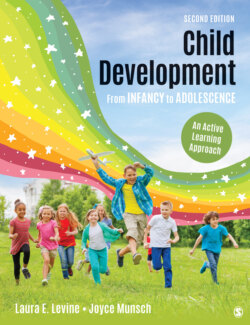Читать книгу Child Development From Infancy to Adolescence - Laura E. Levine - Страница 117
На сайте Литреса книга снята с продажи.
Lev Vygotsky’s Sociocultural Theory
ОглавлениеLev Vygotsky (1896–1934), a Russian psychologist, had somewhat different ideas about cognitive development, emphasizing the importance of the social world and of culture in promoting cognitive growth. According to Vygotsky (1986), learning first takes place in the interaction between people; then the individual internalizes that learning and it becomes a part of his own independent thinking.
Vygotsky was more interested in what a child could become than in how the child currently functioned. He believed that looking at what the child is capable of learning in interaction with a skilled helper is a better indicator of his level of cognitive development than just testing what he already knows. He developed the concept of the zone of proximal development, defined as “the distance between the actual developmental level as determined by independent problem solving and the level of potential development as determined through problem solving under adult guidance or in collaboration with more capable peers” (Vygotsky, 1978a, p. 86).
Zone of proximal development: According to Vygotsky, this is what a child cannot do independently but can do with help from someone more skilled or knowledgeable.
Proximal refers to being near or close. A good teacher must first determine what children already know and then challenges them to learn something near enough to what they already know so that they will be able to make sense of it, a process called scaffolding. A scaffold is a structure put around a building to allow people to work on it. In Vygotsky’s concept, adults help the “construction” of the child’s understanding by providing guidance and support (the scaffolding). Just as the scaffold comes down when a building is completed, so too the adult can step back when the child fully understands. For example, a 2-year-old may need you to hold her hand on the handle of a jack-in-the-box but by age 3 she is likely to be able to do it herself. Your input is no longer needed, and your “scaffolding” can come down. You will learn more about these concepts in Chapter 9.
Scaffolding: When more knowledgeable adults and children support a child’s learning by providing help to move the child just beyond his current level of capability.
